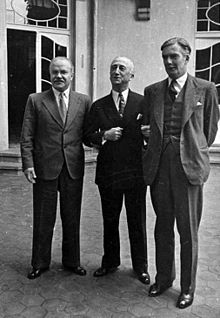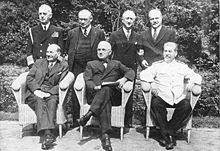James F. Byrnes
James Francis Byrnes (born May 2, 1882 in Charleston , South Carolina , † April 9, 1972 in Columbia , South Carolina) was an American Democratic Party politician . He was Secretary of State of the United States from 1945 to 1947 and Governor of South Carolina from 1951 to 1955 .
Life
Early years and political advancement
Young James Byrnes had to drop out of school for financial reasons at the age of 14. From 1900 he was clerk in the Second Judicial District in South Carolina. During this time he acquired the necessary legal knowledge through self-study and internships in order to be admitted to the bar in 1903. He then began a successful career, both as a lawyer and as a politician. From 1908 to 1910 he was a public prosecutor in the Second Judicial District. From 1911 to 1925 he was a member of the United States House of Representatives . After this time he was a lawyer in Spartanburg until 1931 before he was elected to the United States Senate, where he remained until 1941. There he was a supporter and personal friend of President Franklin D. Roosevelt and his politics. This was followed by a visit to the Supreme Court of the United States ( Supreme Court ) on which he worked as a judge until October 1,942th In the history of that court, he was the last judge appointed to judge without attending a law school. In May 1943 he was appointed director of the mobilization authority. He held this office until April 1945. He was also a member of President Roosevelt's delegation to the Yalta Conference .
US Secretary of State


As the successor to Edward Stettinius , President Harry S. Truman appointed him Foreign Minister on July 3, 1945. During his two-year tenure in the Truman cabinet , he took part in the Potsdam Conference in July / August 1945 and in the Paris Peace Conference in 1946 . He was also instrumental in Truman's decision to drop the first atomic bomb on Japan by encouraging the president to take this step. Although they agreed on foreign policy, personal tension arose between the president and Byrnes, which led to Byrnes' resignation in January 1947. He was succeeded by George C. Marshall .
Governor of south carolina
In 1950, Byrnes ran for governor of South Carolina. It was relatively easy for him to secure the nomination. The election on November 7, 1950 was only a matter of form because there was no opponent. Byrnes is the oldest governor of South Carolina when he took office. During his tenure he initiated a fundamental school reform. The previous 1200 school districts were reduced to 102 by amalgamation. Schools for African-American children have also improved. A three percent value added tax was introduced for financing. However, nothing was changed about racial segregation . To this end, the country's constitution was even changed. The government now had the power to close schools to prevent blacks from integrating. This was a response to an expected decision by the Supreme Court ( Brown v. Board of Education ) that declared segregation schools unconstitutional. That judgment was actually passed on May 17, 1954.
Further life path
The South Carolina constitution did not allow direct re-election of a governor. For this reason, Byrnes had to resign on January 18, 1955 from his office. In the following years he found his Democratic Party too liberal. Although he remained a member of the party, he sympathized with the Republicans . He supported the Republican presidential candidates until his death.
miscellaneous
On September 6, 1946, as Foreign Minister in the Great House of the State Theater in Stuttgart, he held the so-called " Hope Speech " for Germany, in which he held out the prospect of a possible free exchange of goods and knowledge between the occupation zones and the abolition of the administrative areas of the occupying powers - an idea which was realized only months later with the establishment of the bizone and formed the basis for the connection to the west of what would later become the Federal Republic of Germany.
In that speech he also conveyed the intention of the USA to work for a free Germany. Byrnes originally intended to deliver his speech in Paris to the Council of Foreign Ministers of the Allied Powers, but was urged by the American military governor of the zone of occupation, General Lucius D. Clay , to deliver the speech in Stuttgart. For this reason, a street was later named after him in Stuttgart. It is located north of the Pragsattel on the Burgholzhof, right next to the Robinson Barracks , an American military barracks.
James F. Byrnes was a member of the Freemasons Association .
Awards
The TIME Magazine chose Byrnes 1946 "Man of the Year" . From the point of view of the magazine's editors, he had the greatest impact on the world that year.
literature
- Edward S. Mihalcanin: James F. Byrnes. In: Derselbe (Ed.): American Statesmen: Secretaries of State from John Jay to Colin Powell . Greenwood Publishing 2004, ISBN 978-0-313-30828-4 , pp. 88-97.
- John J. Patrick, Richard M. Pious, Donald A. Ritchie: The Oxford Guide to the United States Government. Oxford University Press, New York 2001, ISBN 978-0-19-514273-0 , p. 76 (= Byrnes, James F .: Associate Justice, 1941-42 ).
Web links
- Literature by and about James F. Byrnes in the catalog of the German National Library
- Newspaper article about James F. Byrnes in the 20th century press kit of the ZBW - Leibniz Information Center for Economics .
- Curriculum vitae ( Memento of August 8, 2007 in the Internet Archive ) in the DHM database
- James F. Byrnes in the Biographical Directory of the United States Congress (English)
- James Byrnes at the National Governors Association (English)
- South Carolina Information Highway (English)
- Byrne's Stuttgart speech at the State Agency for Civic Education in Baden-Württemberg
- James F. Byrnes in the Miller Center of Public Affairs of the University of Virginia (English)
- James F. Byrnes in the database of Find a Grave (English)
Individual evidence
- ↑ Wisdom Lodge List of Famous Freemasons ( en ) Wisdom Lodge # 202 Pasadena, CA. Archived from the original on January 28, 2013. Retrieved May 20, 2013.
| personal data | |
|---|---|
| SURNAME | Byrnes, James F. |
| ALTERNATIVE NAMES | Byrnes, James Francis (full name) |
| BRIEF DESCRIPTION | American Democratic Party politician |
| BIRTH DATE | May 2, 1882 |
| PLACE OF BIRTH | Charleston , South Carolina |
| DATE OF DEATH | April 9, 1972 |
| PLACE OF DEATH | Columbia , South Carolina |





